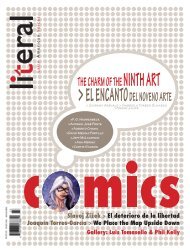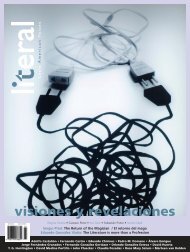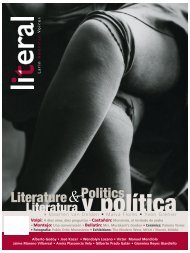Richard Serra - Literal
Richard Serra - Literal
Richard Serra - Literal
You also want an ePaper? Increase the reach of your titles
YUMPU automatically turns print PDFs into web optimized ePapers that Google loves.
not diversity. There is diversity, and within this diversity<br />
there is some confl ict. Tolerance is relevant. Tolerance<br />
doesn’t mean we give up our views, but we equally respect<br />
others’ way of life on the basis of reincarnation. I<br />
have the right to keep my own faith and everyone else<br />
have the same right. And in some cases their ideology<br />
is a different ideology. In my own case, I’m Buddhist.<br />
Sometimes I describe myself as a stubborn Buddhist. In<br />
my mind, I don’t have a concept of a creator. But my<br />
friends, whether they are Christians, Muslims, Jews,<br />
Hindus, they believe in a creator, in a God. It is absolutely<br />
wrong to say that, because I have no ideas of<br />
God, their ideas are not important. [So through this<br />
tolerance] I got a benefi t. My brothers have different<br />
concepts, different views bring them immense benefi t.<br />
In fact, all human traditions have the same potential to<br />
produce good human beings.<br />
Now, for example, according to my own experience,<br />
the way of life and practice of the late Thomas<br />
Martin is comparable to the Buddhist. His daily personal<br />
life was also very similar to mine. I was told his<br />
day started at 2.30 a.m and ended at 7:30 p.m. So my<br />
daily life starts at 3:30 a.m. then I go to sleep around 8<br />
p.m. Look at Mother Theresa, totally dedicated to poor<br />
people, I think her practice is more a compassionate<br />
practice than my own. Both these views, that of Thomas<br />
Martin and Mother Theresa gather strength from<br />
God. My strengths come from Buddha, who taught me<br />
about the law of causality, rather than about a creator.<br />
But that is not relevant, the important fact is that,<br />
like food, it doesn’t matter which fi eld it comes from.<br />
Some may use synthetic fertilizer, natural fertilizer. It’s<br />
all fi ne as long as they have good taste and protein. So<br />
similarly, it doesn’t matter if some say God and some<br />
others no God. In practical life we don’t have a relationship<br />
with God. That’s a very mysterious level. So<br />
for a Buddhist, this concept of salvation is a mystery;<br />
It doesn’t really matter, so we can leave it aside. What<br />
is important is from that tradition, how we can immensely<br />
benefi t and improve the individual.<br />
Some people describe Buddhism as a kind of atheism.<br />
In fact, strictly speaking, Buddhism is not even a<br />
religion, because there’s no faith in a god. Then, from<br />
the Buddhist point of view, on the philosophical level,<br />
some other religious traditions seem like nihilism; from<br />
the Buddhism point of view certain religions may be<br />
seen as absolutism. A healthful lesson from Buddhism<br />
is that among the Buddhist traditions there are different<br />
philosophies. These philosophies with fundamental,<br />
contradictory differences come from same source:<br />
one teacher. So with respect, I joke in telling people<br />
that these confusion of philosophies do not come out<br />
of Buddha´s own confusion. We believe that Buda is<br />
enlightened. There is no room for uncertainty. This line<br />
of thought leads us to the conclusion that Buddha created<br />
these contradictory philosophies in order to create<br />
Lama Temple - Yonghegong in Beijin. This Temple was for a very long time the residence of the Panchen<br />
Lama, when he visited Beijing.<br />
Some people describe Buddhism as a kind of atheism. In fact,<br />
strictly speaking, Buddhism is not even a religion, because<br />
there’s no faith in a god.<br />
more confusion among his disciples and followers. It<br />
is certainly not the case. Buddha was full of compassion.<br />
So the conclusion is that among all his disciples<br />
there are mental dispositions therefore you need different<br />
views accordingly. Buddha taught deliberately according<br />
to the suitability of his followers. From here we<br />
learn valuable lessons: to seek other teachers. Theistic<br />
religions, from the Buddhist point of view, are different,<br />
but it doesn’t matter because that faith is suitable<br />
for millions of people.<br />
And we can witness the good fruits of such tradition.<br />
There are many wonderful Muslims among my<br />
friends; one of them once told me that according to<br />
his interpretation of the Quran, anyone who calls himself<br />
a Muslim and creates bloodshed is not a Muslim.<br />
So love and kindness towards, not only human beings,<br />
but towards creation is present in many religions.<br />
Diversity contains not only superfi cial but substantial<br />
differences, yet through our common essence we<br />
can still work together. We can develop harmony on<br />
the basis of mutual respect. I remember in Australia,<br />
OTOÑO, 2007 • LITERAL. VOCES LATINOAMERICANAS 3 5






